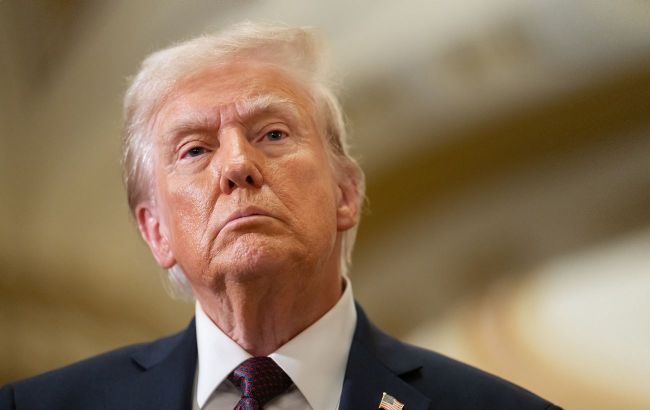Energy offensive: Trump's plan for US and what to expect on Day One
 Photo: Donald Trump is preparing to go on the offensive in the US energy sector (Getty Images)
Photo: Donald Trump is preparing to go on the offensive in the US energy sector (Getty Images)
President-elect Donald Trump intends to torpedo Joe Biden's energy policy starting with his inauguration on January 20. It is expected that his term will be aimed at reducing environmental regulations and increasing fossil fuel production in the United States.
Read RBC-Ukraine's article on what Trump's energy policy will be and what is expected from him on Day One, his first day in office.
Contents
- Trump's energy policy
- Decisions expected on Trump's first day
- What state of emergency in US energy sector might look like
Trump's energy policy
Donald Trump plans to issue up to 100 decrees on a wide range of issues on his first day. Many of them, if not most, will focus on borders and national security, but will also affect the energy sector.
Read more about this in RBC-Ukraine's article.
Regardless of what happens on Day One, the coming weeks promise to be very tense in terms of US energy policy. Forbes highlights several key points.
Canceling Biden's so-called pause in LNG exports. This item may be at the top of Trump's list, as he is working to return the growing industry to the so-called right path, cementing American dominance, and at the same time winning back a share of the Asian market.
The US withdrawal from the Paris Climate Agreement. Trump did this during his first term in office and promised to do it again. This is more than a symbolic action, as the Biden administration has used the agreement as a basic framework for the goals set by the green energy agenda.
Restarting oil and gas leasing. There is no doubt that Trump will order the restart and acceleration of the federal oil and gas leasing program (onshore and offshore). Over the past four years, the Biden administration has taken many deterrent measures.
A complete review of energy policy. The new US president intends to establish a National Energy Council to review oil, natural gas, and electricity policies and make recommendations for their improvement.
Freezing wind power. Donald Trump will almost certainly freeze progress in the offshore wind energy sector for six months. Congressman Van Drew of New Jersey has already announced that he has been instructed to draft an executive order that would impose such a moratorium to reduce projects in federal waters.
Freezing green energy loans. At least until a comprehensive audit is conducted, as there have been many media reports in recent weeks that many grants and loans have been issued to dubious recipients.
Lifting the drilling ban. In early 2025, the Biden administration banned oil and gas production in more than 625 million acres of coastal waters because drilling in these areas is a so-called unjustified risk. Trump criticized the decision, calling it the worst abuse of power he's ever seen, and promised to reverse his predecessor's decree. This could lead to court proceedings to put the matter to rest.
According to Forbes, these are the steps Trump will take at the beginning of his second presidency. He is predicted to have a short honeymoon period as a new president, given that he will not be able to run for re-election. This reality, coupled with the Republican majority in both houses of Congress, likely means that Trump's biggest moves will be implemented through executive orders.
Decisions expected on Trump's first day
At a December rally in Phoenix, Trump said that he had made some big promises on Day One and intended to keep them. He stated that he would lift all of Biden's restrictions on energy production, end his electric vehicle mandate, lift the ban on natural gas exports, and declare an energy emergency.
His first term began with an executive order to stimulate energy production. He ordered the repeal of any regulations that hindered the development of domestic resources. He also reversed several climate initiatives of the Barack Obama administration. Joe Biden criticized Trump's order on his first day in office, but today, January 20, 2025, Trump will have the opportunity to turn the tide, Politico writes.
He and his team have regularly spoken out against the current electric vehicle policy. Although there are no rules for the forced purchase of electric cars, the Biden administration has encouraged the abandonment of gasoline and diesel cars. The president does not have the authority to override federal rules by executive order, but Trump will almost certainly demand a review of greenhouse gas emission limits for cars on his first day.
As for natural gas exports, he has made it clear that he does not support a freeze on new LNG permits and that he intends to reverse course quickly. The Biden administration has put new projects on hold to analyze their impact, and an Energy Department report says that unlimited foreign supplies of fuel will lead to higher domestic prices.
An executive order is also expected today that will resume drilling in the Arctic National Wildlife Refuge (ANWR) in Alaska. This was one of Trump's main campaign themes in the energy sector.
The area was opened for drilling during his first term. However, the first auction of drilling rights attracted little interest from industrialists, and the next administration froze oil exploration. However, in 2017, Congress mandated at least two auctions.
Another step could be the declaration of an energy emergency. What exactly will happen is unclear. Crude oil exports could potentially be restricted. Or the requirements of the Clean Air Act could be suspended. The last time it was suspended was under the 39th President Jimmy Carter in 1977 because of the oil crisis, but not at the national level, but in some regions of the United States.
What state of emergency in US energy sector might look like
According to Trump, a state of emergency in the energy sector will allow him to halve electricity and gasoline prices in the first year of his presidency.
He told his supporters that from day one, he would approve new drilling, new pipelines, new refineries, power plants, and reactors and that they would cut red tape.
It is unclear whether the state of emergency will be symbolic or require broader powers; Trump's team did not respond to a request for comment, CNBC notes.
The state of emergency is often vaguely defined in federal laws, giving the president broad discretion to use them, explains Glenn Schwartz, director of energy policy at Rapidan Energy, a consulting firm. In his opinion, Trump is unlikely to face much resistance in the courts, as they are reluctant to challenge presidential decisions on national security.
We should probably expect a departure from environmental standards in the energy sector. According to the analyst, the president may allow gasoline that does not meet federal air quality standards to enter the market. Other presidents have done this before when they needed to keep prices under control.
Trump may also require power plants to operate at maximum capacity without complying with pollution restrictions. This possibility is spelled out in the federal energy law - its provisions are applied in times of war, or when a sharp increase in demand or shortage of electricity threatens US security.
The largest grid operator, PJM Interconnection, has long been talking about electricity shortages since coal-fired power plants are being shut down faster than new capacity is being launched. The situation may worsen with the growth of demand due to the construction of energy-intensive data centers, the analyst emphasizes.
In addition, Trump may suspend pollution laws for industrial enterprises, power plants, refineries, steel, chemical and other plants. He may also order the acceleration of the leasing of oil and gas production sites in the Gulf of Mexico. However, these decisions are unlikely to have an immediate impact on production. The United States has been the world's largest supplier of oil and gas for six years, ahead of Saudi Arabia and Russia. Leading companies like Exxon and Chevron have made it clear that production decisions are made based on market conditions, not in response to who is in the White House.
Schwartz added that you can lead a horse to water, but you can't make it drink. He explained that Trump could provide all the resources for companies to drill, but he didn't see anything to suggest that Trump could force them to produce oil.
Sources: Forbes, Politico, and CNBC.

